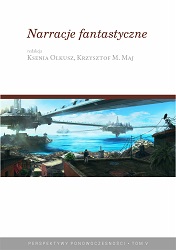Czym są gnostyckie dystopie?
What are Gnostic dystopias?
Reflections on the Gnostic Worldview in Dystopian Studies
Author(s): Fryderyk Kwiatkowski
Subject(s): Philosophy, History of Philosophy, Political Philosophy, Social Philosophy, Film / Cinema / Cinematography, Theory of Literature
Published by: Ośrodek Badawczy Facta Ficta
Keywords: gnosticism;gnostic anthropology;gnostic dystopias;dystopia;dystopian discourse;dystopian society;dystopian studies;dystopian film
Summary/Abstract: The inquiry delivered in Fryderyk Kwiatkowski’s chapter of possible affinities between ancient Gnosticism, perceived as an interpretative and heuristic category, and utopian/ dystopian texts has not been performed in comparative studies. The aim of this article is therefore to fill this void to demonstrate that gnostic thought is replete with notions that may have served as the verifiable pre-modern source of the constructive characteristics of utopias and dystopias. Alex Proyas, the author, examines "Dark City" (1998) as his primary case study for his investigative research on gnostic thought characteristics in utopias and dystopias. Other sources of his substantive research include twenty-first century American film. It is worthy to note that Proyas classifies all of his research sources as “gnostic dystopias”. Proya’s notion of “gnostic dystopias” refers to texts embedded with structural and narrative traits of classical examples of dystopias. Novels such as the likes of "Brave New World" by Aldous Huxley or "Nineteen Eighty- Four" by George Orwell can be construed as being literarily consistent with gnostic ideals.
Book: Narracje fantastyczne
- Page Range: 253-274
- Page Count: 22
- Publication Year: 2017
- Language: Polish
- Content File-PDF

